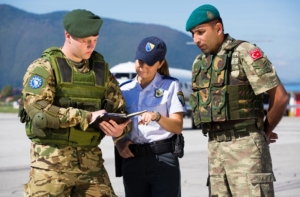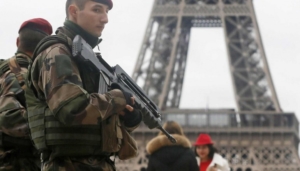L’UE sempre più “operativa” nelle aree di crisi: nuova missione in Iraq, confermata missione in Bosnia, adottata nuova strategia per l’Afghanistan
Il 16 ottobre è stata una giornata impegnativa per la politica di sicurezza dell’UE, per vari motivi.
In primis, il Consiglio ha lanciato una nuova missione civile nell’ambito della politica di sicurezza e di difesa comune (PSDC) in Iraq. La missione sarà incentrata sul sostegno alle autorità irachene nell’attuazione degli  aspetti civili della strategia di sicurezza nazionale dell’Iraq, e sarà guidata dal tedesco Markus Ritter. Saranno 35 gli esperti dell’UE che forniranno consulenza e assistenza in diversi settori fondamentali identificati come “critici” (nel senso anglosassone del termine) dalle autorità irachene. La missione dovrebbe essere dispiegata a Baghdad entro la fine dell’anno, e dovrebbe avere un costo (inziale) di 14 milioni di euro. La missione, sotto egida PSDC si inquadra nelle missioni così dette “civili” dell’UE: ossia quelle missioni che hanno il principale obiettivo di ricostruire le istituzioni nei paesi martoriate dalla guerra, che ne siano usciti o ne stiano uscendo. Normalmente l’UE invia degli esperti (per l’appunto) civili, affinché affianchino le autorità locali e tentino di riformare e rifondare i settori della pubblica amministrazione: polizia, apparato giudiziario, sanità. Ma gli esperti possono fornire consulenza anche in settori come l’uguaglianza di genere ed i diritti umani; insomma: tentano in ogni modo di ripristinare o di stabilire lo stato di diritto. Le missioni dell’UE vengono dirette dal Comitato Politico di Sicurezza, che risponde all’Alto Rappresentante per la Politica Estera dell’UE (ora Federica Mogherini). L’Alto Rappresentante è a capo del SEAE, il Servizio di Azione esterna dell’UE, e presiede anche il Consiglio dell’UE nella sua versione “Affari Esteri” (cosa anomala per il Consiglio, la cui presidenza nei diversi settori
aspetti civili della strategia di sicurezza nazionale dell’Iraq, e sarà guidata dal tedesco Markus Ritter. Saranno 35 gli esperti dell’UE che forniranno consulenza e assistenza in diversi settori fondamentali identificati come “critici” (nel senso anglosassone del termine) dalle autorità irachene. La missione dovrebbe essere dispiegata a Baghdad entro la fine dell’anno, e dovrebbe avere un costo (inziale) di 14 milioni di euro. La missione, sotto egida PSDC si inquadra nelle missioni così dette “civili” dell’UE: ossia quelle missioni che hanno il principale obiettivo di ricostruire le istituzioni nei paesi martoriate dalla guerra, che ne siano usciti o ne stiano uscendo. Normalmente l’UE invia degli esperti (per l’appunto) civili, affinché affianchino le autorità locali e tentino di riformare e rifondare i settori della pubblica amministrazione: polizia, apparato giudiziario, sanità. Ma gli esperti possono fornire consulenza anche in settori come l’uguaglianza di genere ed i diritti umani; insomma: tentano in ogni modo di ripristinare o di stabilire lo stato di diritto. Le missioni dell’UE vengono dirette dal Comitato Politico di Sicurezza, che risponde all’Alto Rappresentante per la Politica Estera dell’UE (ora Federica Mogherini). L’Alto Rappresentante è a capo del SEAE, il Servizio di Azione esterna dell’UE, e presiede anche il Consiglio dell’UE nella sua versione “Affari Esteri” (cosa anomala per il Consiglio, la cui presidenza nei diversi settori

di legiferazione, normalmente, è a rotazione). L’Alto Rappresentante è anche uno dei Vice Presidenti della Commissione europea: è l’unica figura, quindi, a cavallo sia del Consiglio che della Commissione. Il Comitato Politico di Sicurezza ha due ulteriori entità alle sue dipendenze: il Comitato Militare dell’UE, che guida le missioni di taglio più “robusto” o militare, ed il così detto CIVCOM o comitato per la gestione civile delle crisi. A occhio e croce questa nuova missione in Iraq dovrebbe inquadrarsi sotto l’egida del CIVCOM. L’obiettivo della strategia di sicurezza nazionale dell’Iraq è creare istituzioni statali capaci di consolidare la sicurezza e la pace e di prevenire i conflitti, rispettando nel contempo lo Stato di diritto e le norme in materia di diritti umani. La strategia individua una serie di minacce urgenti alla sicurezza nazionale – tra cui terrorismo, corruzione, instabilità politica e polarizzazione etnica e settaria – che la missione PSDC contribuirà ad affrontare.
La missione opererà in stretto coordinamento con la delegazione dell’UE in Iraq e con i partner internazionali presenti nel paese, compresi il Programma delle Nazioni Unite per lo sviluppo (UNDP), la NATO e la coalizione internazionale contro lo Stato Islamico. Il che significa che le questioni squisitamente militare

resteranno un affaire della NATO.
In secundis, il Consiglio ha ribadito e confermato il suo impegno a favore della prospettiva europea della Bosnia-Erzegovina come paese unico, unito e sovrano ed ha ufficialmente stigmatizzato il fatto che, negli ultimi mesi, le riforme siano state rallentate a causa di politiche legate al (triste) passato e di polemiche sorte in occasione delle elezioni anticipate.
Per tale motivo, l’Istituzione europea ha dichiarato, con una nota, che approva ed accetta di buon grado il fatto che l’operazione ALTHEA continui ad esistere in BiH. Le forze militari impegnate nell’operazione contribuiscono ormai da tempo alla capacità di deterrenza delle legittime autorità bosniache nelle situazioni di crisi. Inoltre, non si può non dire che la forza multinazionale europea, con sede presso la base di Butmir e “succursali” in tutto il paese, ha effettivamente contribuito anche a formare ed incrementare le capacità delle forze armate e di polizia bosniache e, più in generale, a sostenere tutti i settori della pubblica amministrazione che andavano riformati.
Infine, sempre il Consiglio ha adottato delle conclusioni su una strategia dell’UE relativa all’Afghanistan. Nel documento è stato ribadito l’impegno a lungo termine dell’UE e degli Stati membri in Afghanistan per promuovere la pace, la stabilità e lo sviluppo sostenibile. La strategia si concentra su quattro settori prioritari, così come elencati nel documento: la promozione della pace, della stabilità e della sicurezza nella regione; il rafforzamento della democrazia, dello stato di diritto e dei diritti umani e la promozione della buona governance e dell’emancipazione delle donne; il sostegno allo sviluppo economico e umano; la gestione delle sfide legate alla migrazione. L’UE vanta ormai una lunga storia di cooperazione con l’Afghanistan ed in Afghanistan volta a contrastare la corruzione e la povertà ed a favorire la crescita economica ed il rafforzamento delle istituzioni democratiche.
In un solo giorno tre segnali da parte di un UE sempre più impegnata ben oltre i suoi confini, e – come nell’ultimo caso esaminato – ben oltre le così dette politiche di vicinato. In futuro, aspettiamoci un’Europa sempre più solida e più compatta nel campo della risoluzione (militare o civile) delle crisi internazionali, magari anche al fianco della NATO e, sicuramente, su mandato dell’ONU.
(fonte www.consilium.europa.eu)





 numerosissime iniziative intraprese nel settore dallo Stato membro baltico, di cui abbiamo esaltato parecchie peculiarità diverse volte qui su Europeanaffairs.it (
numerosissime iniziative intraprese nel settore dallo Stato membro baltico, di cui abbiamo esaltato parecchie peculiarità diverse volte qui su Europeanaffairs.it (


